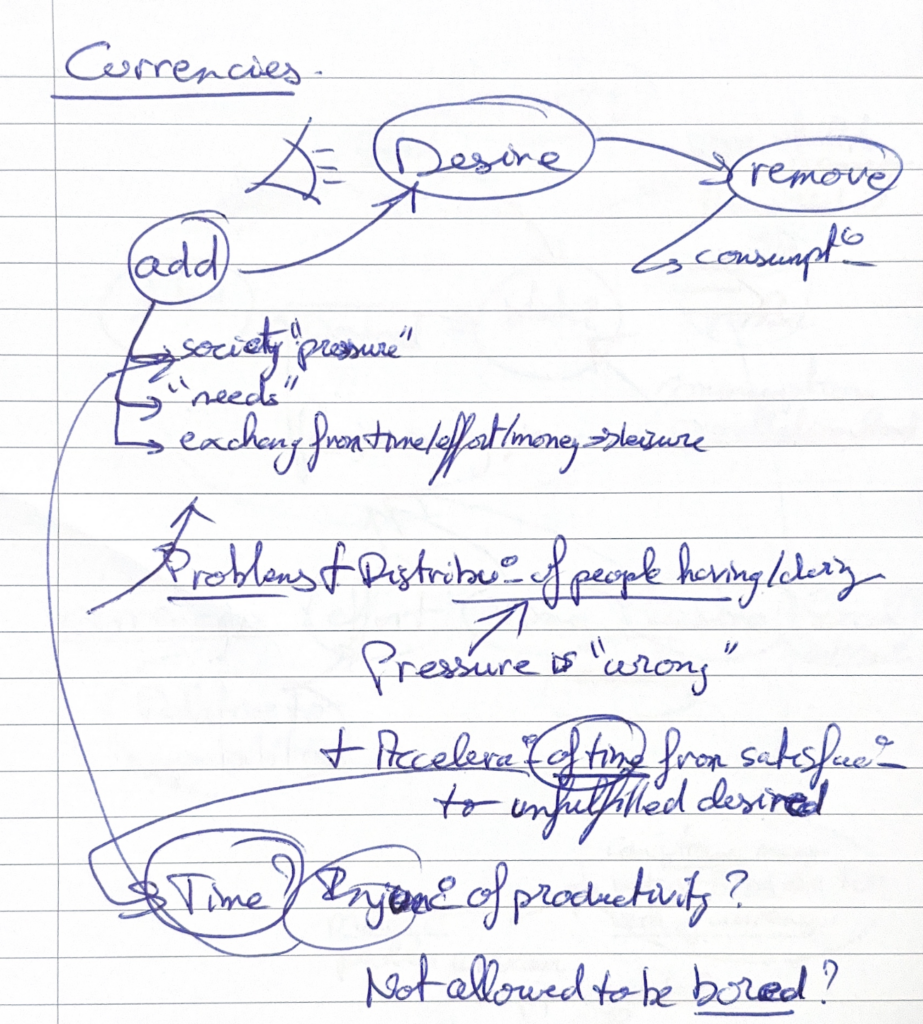When contemplating the idea of modelling the world, a recurring thought emerged: why do we fill these pipelines of desires? Our actions are often driven by wishes or desires and can be sustained to some extent by the behavioural model, as referenced in my previous post, Is there any Equilibrium. At some point, the objects of our wants should be fulfilled, leaving us with a positive feeling of accomplishment and one less desire.
Maslow and cycled needs
One intriguing aspect is the distinction between basic needs—such as physical and mental safety—and additional wants that our brain perceives as needs. For instance, we require the internet for certain jobs, but social cues can also influence our perceived needs, like the notion of “needing” an air fryer. Let’s be honest: nobody truly needs an air fryer; we simply want or desire one. Once a genuine need is met, we experience physical relief and can continue functioning. But is it the same with desires? I don’t believe so.
Some needs must be fulfilled cyclically, such as breathing, food, water, and sleeping safely. This cyclical nature also applies to less basic needs like social interactions, which can be seen as psychological safety. But social interactions, as a form of psychological safety, can also blur the line between need and desire. To what extent do you need to travel across the world for social interactions? What are your motivations in terms of needs? Is there truly no alternative that would satisfy this need without overlapping with a desire?
Desires may also follow cycles. For example, I have that urge to scroll aimlessly on Instagram every evening. This behaviour is driven by instant gratification, which is easily obtained but does not fulfil a need and may even have negative consequences. Consider the CO2 emissions from storing and streaming these videos, or the content creators—those elite aspirants, as Peter Turchin describes them—struggling with low revenues, with only a few truly benefiting.
So, what generates these desires? How do we fulfil them? What are their impacts? And is there no alternative? Reflect on your own desires and consider their origins and impacts.
So why do we desire?

I believe there are multiple factors at play, such as societal pressure and the way we refer to “needs” as an oversimplification of enhanced experiences with additional small benefits. For example, we might purchase freshly squeezed orange juice instead of buying whole oranges to press ourselves when needed. We can only fulfil these desires by exchanging time, effort, or money—resources that are often intertwined. The desire is then extinguished once it is fulfilled, usually through consumption.
Over time, we observe an accumulation of desires, especially new ones that are consumed ever faster, leaving us in a state of constant dissatisfaction. We find ourselves in an era of overconsumption and growing dissatisfaction, which adds more problems to our societies. This is particularly evident with the constant growth of unfulfilled desires that were promised to us if we studied harder, performed better, or became “more” or “did more.”
What is happening to us for always wanting more?
I believe this is due to our increasingly rapid consumption habits. We often fail to appreciate the time and craftsmanship involved in creating objects, as mass production accelerates. Additionally, as the cost of these objects decreases, our desire for more increases.
So we are doomed to be continuously unsatisfied? I think not
First, we can reflect on our desires, understanding them and considering in advance what they will bring us and how long the fulfilment will last before a new need arises.
Once we decide to fulfil a desire, we should consider how we will do so and its impacts on ourselves, the environment (both locally and globally), and our societies. Who benefits from our choice to acquire this need, and is it sustainable?
Then, we can choose how to enjoy the moment during the consumption of the desire. Will we savour every minute? Will we focus solely on this experience or multitask? Will we appreciate the time and cost of acquisition?
Finally, after consumption, how will we reflect on it? Will we be able to appreciate the moment for what it was? Will we keep a memory of it to revisit later? How will we make that memory last to prolong the satisfaction?
By following these four steps, I believe we can regain control over our desires and the time we might otherwise “waste” by merely scratching the surface of fulfilment.
One last thing
We can cycle through each of our desires and learn to appreciate the time spent being bored. We don’t always need to fulfil our wants immediately. The well-known saying “it’s not about the goal, it’s about the journey” applies to the fulfilment of our desires as well. During that journey, we should embrace the boredom of doing nothing. This allows our thoughts to wander and gives our brain the space to work its magic on the reflections we have. Who knows, it might even extinguish a desire before it becomes so strong that it consumes our focus.
And you, what was your last desire? How did you feel once it was achieved? Was there any desire that was naturally extinguished before being realised? Feel free to reach out at night-thoughts@poyer.org with any of your remarks or thoughts about it.